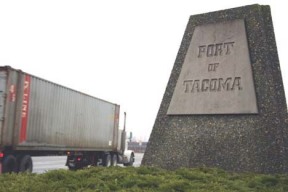As the Port of Tacoma grows, how will intermodal trucking operations grow with it?
That is the question port staff are examining — answers to which were shared with port commissioners during a Feb. 9 study session.
Three months ago, the port assembled a 10-member team of staffers to examine the intermodal trucking aspect of its business. A report documenting the findings of that team was shared during Thursdays study session.
One concern: while the port is well-known for its intermodal rail, it has failed to focus similar efforts toward intermodal trucking.
Another concern: a lack of coordination among staff in areas of strategic planning and communication when it comes to intermodal trucking.
As the number of containers entering the port grows, intermodal trucking will grow, said Anthony Taormina, director of the ports automobile line of business, who reported the teams findings to port commissioners. All lines of business at the port impact or touch the trucking industry.
According to the teams findings, intermodal trucking needs to be part of the ports overall operations and organizational priorities, and must have clear ownership. There needs to be a single focus so there is single ownership internally and externally, said Taormina. At times, customers dont know who to go to.
The team proposed a number of solutions which port staff plan to examine further, such as: establishing transportation corridors, exploring new technologies that would improve the speed of trucks through terminals, and adding value to activities that support the ports intermodal trucking companies.
More than 1,300 Washington firms ship intermodally through the port, and Inland Transportation is one of the largest employers among port-related customers.
This is a big issue that could possibly be qualified as a single line of business down the road, said John Wolfe, the ports deputy executive director. Wolfe said the port has historically focused its intermodal line of business on rail operations. The trucking aspect is growing as well, said Wolfe.








